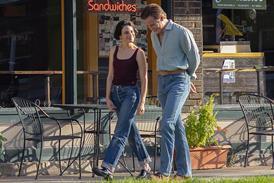Dir:Hou Hsiao-Hsien. Japan. 2004. 92mins.
One of the most consistently interesting of Far Easternarthouse directors, Hou Hsiao-Hsien has a dedicated following on the festivalcircuit and a tiny film-buff fanbase in the real world. It's telling that not asingle Region 2 DVD of any of the Taiwanese director's films is currentlyavailable on Amazon UK, though the French branch of the online retailer offersseveral - proof of the high regard in which Hsiao-Hsien is held in France,where he has inspired, among others, critic-turned-filmmaker Olivier Assayas.
Cafe Lumiere, which screened incompetition at Venice, is unlikely to broaden the director's audience beyondthat of his 2001 Cannes Jury Prize winner Millennium Mambo - a filmwhich took the heady sum of $15,000 on its US run. But for anyone prepared toinvest the time and the patience, this slow, tender, beautifully-shot homage toJapanese master Yasujiro Ozu will pay rich dividends.
Intrue Ozu style, Hsiao-Hsien homes in on those everyday details that fill up thespace between the big, dramatic turning points of our lives. Take the scenewhere Yoko (Japanese pop star Yo Hitoto, impressive in her first film role)reveals to her mother that she is pregnant. We see a brightly-lit kitchen, butonly as much as is framed by the door; the fixed camera is relegated to thedarkness of the dining room behind, registering the simple gestures of Yoko andher mother as they prepare breakfast and talk about this and that, movingcasually in and out of this rectangle of light and colour. Then Yoko flicks thedining room light on, and the two women sit cross-legged on the floor by thelow table, until, just as casually, she drops the bombshell - and we realise,in the very moment she says it, that she's going to be fine.
Therest of the action, if such a grand word can be used of this succession ofnon-scenes, concerns the laid-back friendship between Yoko and Hajime (TadanoboAsano, doing a variation on the taciturn librarian he played in Last Life InThe Universe) the quiet and studious owner of a secondhand bookshop. Withthe most faint and oblique of brushstrokes, Hsiao-Hsien makes it clear thattrendy city-girl Yoko derives a calming spiritual energy from Hajime, while he,for his part, has a crush on her which will probably never be declared.
Thegentle sound texture of the film - the work of talented Taiwanese soundtechnician Tu Duu-Chih - alternates or superimposes distant traffic noises, theclack of teacups, voices off, the rumble and surge of trains (which Hajimelikes to record), contributing to the film's exaltation of the everyday.
Thereare even some moments of quiet humour - as when we finally discover why thefriends and acquaintances she meets are always thanking Yoko for her gifts ofumbrellas; or the trope (almost a running gag) of Yoko's father, who is alwayson the verge of launching into the big father-to-daughter talk, but never quiteplucks up the courage.
Butthe real proof of the director's bravura comes with the charmingly laconicending: on the surface, it is open and unresolved; but deep down, it deliversthe closure of a good romantic comedy.
Prodcos: ShochikuCo, The Asahi Shimbun Company, Sumitomo Corporation, Eisei Gekijo Co, ImagicaCorp
Int'l sales: Shochiku Co (Asia), Wild Bunch (rest of world)
Prods: HideshiMiyajima, Liao Ching-Sung, Ichiro Yamamoto, Fumiko Osaka
Scr: HouHsiao-Hsien, Chu T'ien-Wen
Cine: LeePing-Bing
Prod des: Tashiharu Aida
Ed: LiaoChing-Sung
Main cast: Yo Hitoto, Tadanobu Asano, Masato Hagiwara, Kimiko Yo, Nenji Kobayashi

















No comments yet